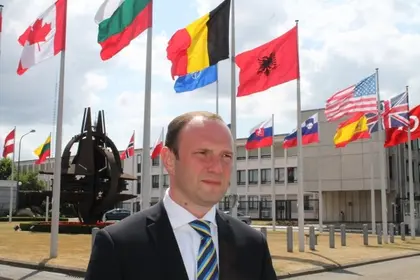BRUSSELS — Yehor Bozhok, acting head of Ukraine’s NATO mission, told the Kyiv Post on May 20 that he expects the alliance’s July summit in Warsaw will lead to greater financial commitments to Ukraine.
As Ukraine defines its needs more specifically, Bozhok said he expects NATO’s 28 members will contribute more to trust funds set up to help Ukraine improve its defense capabilities with the ultimate aim of joining the alliance someday.
- See the most recently published Ukraine news reports from today.
- Get the freshest Ukraine news updates as of today.
JOIN US ON TELEGRAM
Follow our coverage of the war on the @Kyivpost_official.
In 2014, following Russia’s annexation of Crimea and invasion of eastern Ukraine, NATO set up four trust funds to help Ukraine improve and modernize its defense capabilities in four areas: C4 (command, control, communications and computers), logistics and standardization, cyber defense, training for military career transition and medical rehabilitation.
While Ukraine does not have a membership action plan to join NATO, which the nation hopes to do by 2020, it does have an annual national program with NATO, a step that Bozhok thinks is sufficient to chart a path to ultimate membership.
The NATO trust fund contributions to date for Ukraine stand at roughly 5 million euros, a small but sufficient amount to help Ukraine at its present stage of defense development. “We have enough money to finance current projects,” Bozhok said on the sidelines of the NATO foreign ministers conference in Brussels. “As we approach the summit, we are trying together with NATO towards more mid-term and more deep practical cooperation in the context of implementation of all these new concepts, visions and strategies.”
Ukraine has a new national security strategy, a new military doctrine and is putting the finishing touches on a strategic defense bulletin, he said.
“Then it will be about implementation. Then it will be about more funds to the trust funds. Then it will be about more substantial, practical projects to implement the new philosophy,” Bozhok said.
‘Very easy’ to work with NATO
Bozhok said it is “very easy for me” to work with NATO because its members have a clear understanding that Russia is to blame for the aggression against Ukraine.
“They clearly know the peculiarities of the situation; they clearly know who should be blamed for the situation,” Bozhok said. “They clearly know that it is simply impossible to achieve sustainable progress in the political part of the Minsk arrangements without achievement of the principle agreements like cease-fire, withdrawal of troops and control over the border. If we are talking about local elections, all parties to the process have confirmed and recognized that the only valid elections, local elections, are those conducted to OSCE (Organization for Security and Cooperation in Europe) standards and under ODIHR (Office of Democratic Institutions and Human Rights) monitoring.
While Ukraine is still hoping for better weapons from individual Western nations, NATO is already helping Ukraine’s defenses in many other ways.
“We are still expecting the arms,” Bozhok said. “While the process is evolving, our requirements change. We are self-upgrading with the help of NATO, US and other allies. We have manged to restore our defense capabilities to a certain level.”
With NATO, “we have launched long ago a dynamic information exchange,” Bozhok said. “It’s a two-way street, not just Ukraine providing information. It’s also NATO providing information to us about the situation on the ground, the strategical and tactical approach of the Russian Federation and its proxies.”
‘Problem is definitely not here’
In NATO headquarters, Bozhok said, “everything is crystal clear here. If we are talking about prolongation or the strengthening of sanctions against Russia, the problem is definitely not here.”
At the same time, the West’s sanctions against Russia are still not strong enough for Ukraine.
Bozhok called renewal of existing sanctions to the end of the year “the minimal step.”
Ideally, the West would impose such economically crippling sanctions that Russia would abandon its war against Ukraine altogether out of financial necessity.
Without specifying whether those measures should include a global SWIFT ban on Russian financial transactions, Bozhok said that sanctions should be of “a scope that will exhaust financially the Kremlin, for them not to have the financial capabilities to continue financing this operation on destabilization and destruction of Ukraine.”
Sooner or later, he hopes the West will adopt Ukraine’s prescription for how to get Russia to call off its war.
Kremlin understands ‘power and pressure’
“From the very beginning and always and at all opportunities; we keep repeating: the only language which the Kremlin, unfortunately, is able to understand is the language of power and pressure,” Bozhok said. “Definitely military pressure or power is not the option. This is not the way things are being resolved in the 21st century. At the same time pressure is needed. That’s why the only means is economic pressure.”
Kyiv Post chief editor Brian Bonner can be reached at bonner@kyivpost.com. Kyiv Post participation in the May 18-20 NATO foreign ministers meeting came at the invitation of the NATO public diplomacy division, which exercises no control over the newspaper’s coverage.
You can also highlight the text and press Ctrl + Enter




